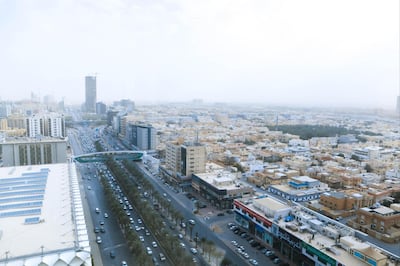Saudi Arabia created 555,000 new jobs in the last four years as the kingdom looks to develop $1 trillion worth of new projects that are part of its Vision 2030 initiative that aims to diversify the economy away from oil.
Vision 2030 is expected to lead to a $1.3tn investment by state-owned oil company Saudi Aramco into Saudi Arabia's private sector in the next decade, as well as increased home ownership for citizens and a lower unemployment rate.
Petrodollars are helping fuel projects like the $500 billion futuristic development known as Neom on the Red Sea coast as well as developments in Riyadh, Jeddah and other cities across the kingdom, a report by global property consultancy Knight Frank said.
“Between 2016 and 2020, 555,000 new jobs have been created across Saudi Arabia and between 2021 and 2030, a further two million jobs are expected to materialise,” Faisal Durrani, partner and head of Middle East Research at Knight Frank, told The National, quoting data from Oxford Economics.
The kingdom's economic reforms have led to the emergence of new quasi-government entities and there is a growing demand from businesses to set up their operations in Saudi Arabia to capitalise on new opportunities, Mr Durrani said.
This is “reflected in the upturn in foreign investment licences being issued – these have almost doubled from about 700 in 2018 to nearly 1,300 last year – this is a good indicator of the expansion of the jobs market”, he said.
“Saudi Arabia’s national unemployment rate fell to 11.7 per cent at the end of the first quarter this year, down from 12.6 per cent at the end of 2020 and the lowest level in five years.”
About $300bn of the total spending is dedicated to new infrastructure projects, including vast new passenger rail networks and a brand new airport for Riyadh, which is expected to be the home base for a new national airline, according to Knight Frank.
“The aggressive targets laid out by the government around attracting 100 million annual visitors to the country by 2030 means both adequate and first-class gateways need to be created," Mr Durrani said. "And we’re already seeing the first of these trickling through. Take, for instance, the new cruise terminal at Jeddah Islamic Port – the first cruise routes are already in operation.”
The cruise industry alone is set to create up to 50,000 jobs nationally, according to the Public Investment Fund, and 1.5 million cruise visitors are expected annually by 2028.
The kingdom is also spending nearly $575bn to deliver over 1.3 million new homes, more than three million square metres of offices and over 100,000 hotel rooms, mostly along the Red Sea coast with Neom being the main project, the report said.
In Riyadh, more than 100,000 new homes are expected by the end of 2023 and close to three million square metres of new office space is being built, along with over 12,000 hotel rooms, spread across mega projects worth an estimated $63bn.
New developments in the capital include the $20bn Diriyah Gate Project with 20,000 housing units, $17bn King Salman Park community with 12,000 units as well as an $8bn mega entertainment project named Qiddiyah. Other schemes include $7.8bn King Abdullah Financial District, $3.2bn Mall of Saudi being developed by the UAE’s Majid Al Futtaim Group and The Avenues Mall.

“Most private sector real estate developers were sitting on the fence during the first few years following the announcement of Vision 2030, however, we have seen inquiries for development consultancy and development management services increase significantly over the last six to 12 months,” Harmen de Jong, partner, real estate strategy and consulting at Knight Frank, said.
The private sector “has also now got much more clarity around how the plans for Vision 2030 are to be rolled out, as momentum builds around delivering the new vision for Saudi Arabia”, Mr de Jong said.
“As a result, we have seen heightened activity in real estate development concepts involving hospitality, retail and entertainment. This trend is being further supported by the ease of access to cheap credit provided by government-backed finance agencies such as the Tourism Development Fund.”
Last year, Saudi Arabia's Tourism Development Fund signed an agreement with two of the country’s major lenders, Riyad Bank and Banque Saudi Fransi, to finance tourism projects worth up to 160bn Saudi riyals ($43bn) in the kingdom.
The emphasis to boost home ownership among Saudi citizens to 70 per cent by 2030 from 60 per cent at present is also fuelling demand for the real estate sector, according to Mr Durrani.
“The government is already 8 percentage points ahead of schedule and this has been possible through the widening of access to bank lending, or mortgages, through programmes such as Sakani as well as the Wafi scheme, which regulates the sale of off-plan homes. Furthermore, the cut to VAT (value added tax) from 15 per cent to 5 per cent for home purchases has also fuelled the market,” he said.
Saudi Arabia’s economy is expected to grow 2.4 per cent this year and 4.8 per cent in 2022, according to the International Monetary Fund. The kingdom's non-oil economy is projected to grow 4.3 per cent this year, according to the fund.


